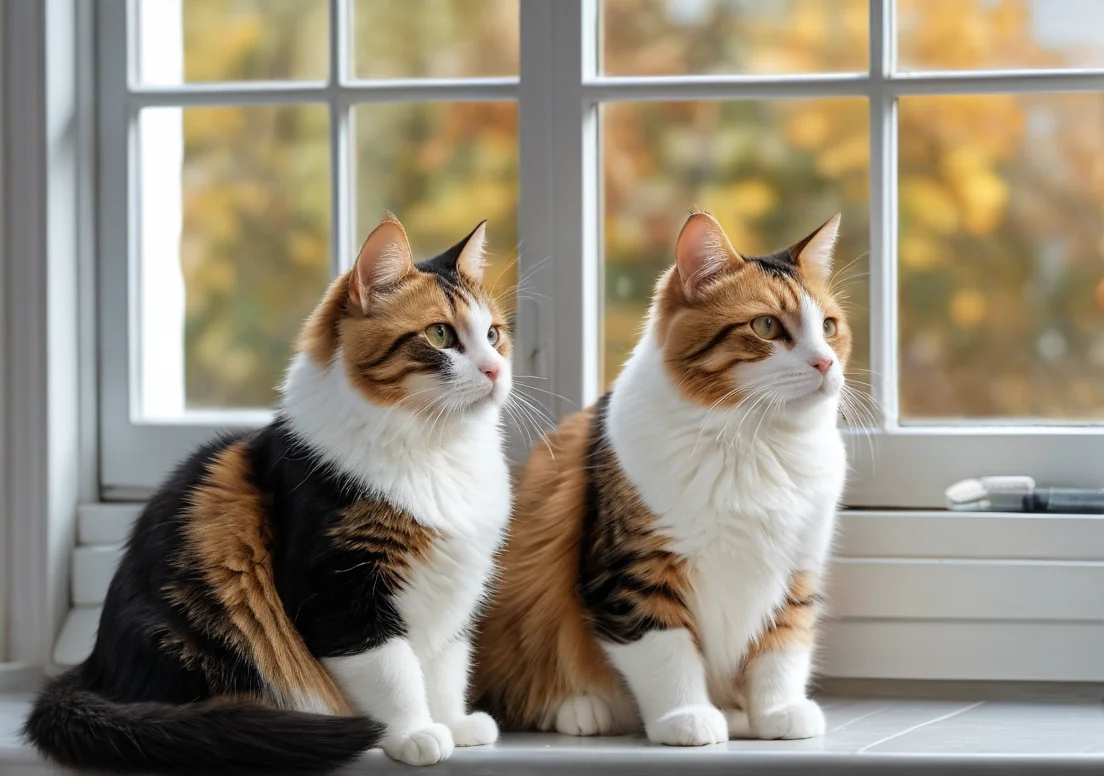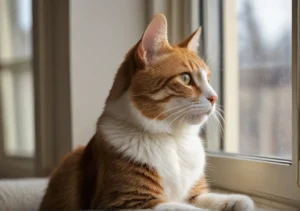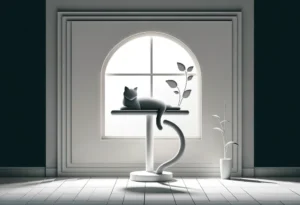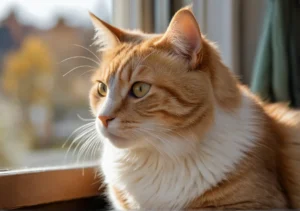Cats have an undeniable fascination with windows. You may catch your furry friend perched on the sill, eyes glued to the outside world, seemingly lost in thought. But what draws them in so irresistibly?
Cats love windows because they provide sensory-rich environments for exploration and stimulation. The sights, sounds, and movements of the outside world engage their natural instincts to hunt and observe. There’s more to this window obsession than meets the eye, so stick around to uncover the hidden reasons behind this captivating behavior.

Why Do Cats Enjoy Watching Wildlife?
Cats are natural-born observers, and there’s something about a busy window scene that ignites their predatory instincts. Watching birds flit by or squirrels scurry around not only entertains them but also taps into their primal urges. Cats are instinctively drawn to movement, and the chaotic dance of nature outside offers the perfect stage.
This phenomenon is backed by their evolutionary history; they are hunters by trade. Engaging with wildlife from a safe distance satisfies their need to stalk and chase, albeit without the risk of injury or the effort of a full chase. Many cat owners notice their pets’ ears perk up and tails twitch as they become engrossed in the action outside, showcasing a classic hunting behavior — a little reminder that your fluffy friend is, at heart, a wild creature.
Moreover, exposure to various sensory experiences through the window—like sounds, sights, and even scents—enriches their environment. It keeps their minds sharp and provides physical and mental stimulation, which is essential for their overall well-being.
Do Windows Provide Safety for Cats?
Windows offer a unique balance of adventure and security that few other spots in the home can. Cats relish the ability to experience the thrill of the outdoors while perched safely inside. It’s a mini escape where they can indulge their inquisitive natures without facing the dangers—like traffic, other animals, or harsh weather conditions—that come with stepping outside.
Safety is a significant concern for many cat owners, and windows act as a protective barrier. The sheer glass keeps them safely inside while still letting them observe the world. This setup means they can satisfy their curiosity and hunting instincts without the worry of their well-being.
Providing your cat with a comfy perch near a window can enhance this experience. A cozy cat tree or a soft blanket on the windowsill allows them to settle in and enjoy the show outside for longer periods. Also, consider the height and location of the windows in your home. Cats often prefer spots where they can see a broad view—like a sunny windowsill or a higher vantage point, which not only keeps them entertained but can also serve as a cozy sunbathing spot.
Encouraging this behavior is a win-win; it provides mental stimulation for your pet while giving you peace of mind knowing they’re not at risk of outdoor dangers.
What Role Does Light Play in Their Attraction?
Sunlight’s not just about warmth; it’s a major mood booster for our feline friends. Cats have a natural inclination to seek out sunny spots because the warmth from the sun helps regulate their body temperature, especially after those long, cozy naps. Being close to a window allows them to soak up precious rays, creating a perfect, fuzzy atmosphere for curling up and relaxing.
Moreover, light plays a role in their hunting instincts. Cats are wired to be predators, and bright areas provide the ideal vantage point for spotting potential prey. Watching the world go by in a sunlit window can keep these instincts sharp and their minds entertained. Providing your cat with a sunny window perch can also contribute to better sleep patterns and overall mental well-being. Just think of it as their personal tiny sunbathing paradise.
How Does the View Affect a Cat’s Behavior?
A window view isn’t just for show; it has real implications on a cat’s curiosity and mood. Cats are visual hunters, and a window acts like a live-action movie screen for them. The sight of birds chirping, leaves rustling, or even a stray cat can spark their interest and keep them engaged for hours. This interaction with their environment is important for mental stimulation, helping prevent boredom.
You’ll find different views can trigger varied responses. A bustling street might fuel excitement, while a quiet garden could promote a serene state. If you’ve got an urban view, try to create distractions like bird feeders outside. Not only does it add entertainment, but it’s also a great way to enrich their environment.
Additionally, consider this: the height of the window can impact how they feel. Cats often prefer elevated spots—it’s instinctual, giving them a sense of security and control over their territory. If your home allows, offering them access to higher windows can enhance their exploration experience.
Are There Health Benefits to Window Watching?
Gazing out the window isn’t just a leisure activity for cats; it’s an engaging experience that can be beneficial to their well-being. Mental stimulation is a significant benefit—watching birds, squirrels, and passing cars piques their curiosity and keeps their brains active. This is especially important in indoor cats, who might otherwise lack sufficient environmental enrichment.
Additionally, window watching can help reduce stress and anxiety. The sights and sounds of the outside world provide a healthy distraction, preventing them from becoming bored or overstimulated within their indoor environment. It’s almost like a meditative experience—focused observation that calms their minds.
From a physical standpoint, let’s not forget that a good window perch encourages exercise. Cats might dash back and forth, leap to their perch, or even engage in some playful pouncing at imagined prey. All of this action contributes to a healthier and more active lifestyle.
Lastly, studies have shown that animals who engage in window gazing tend to show fewer signs of behavioral issues. This typically translates to happier, more social pets who interact better with both humans and other animals. So, providing a view can really be an investment in your feline’s overall mental and physical health.
How to Create a Window Perch for Your Cat?
Setting up a cozy spot for your cat to watch the world go by is easier than you’d think. Start by choosing a safe window that’s free from drafts and high traffic. Ideally, it should offer a good view of nature or the street.
Consider these helpful steps to create an enticing window perch:
– Use a cat shelf or hammock: These can be mounted securely to the wall, offering a comfy place to lounge while watching. They’re space-efficient and can complement your decor.
– Add cushions or blankets: Create a soft, inviting space using washable blankets or pet-friendly cushions. Cats love snuggling while they survey their domain.
– Include scratching surfaces: Hanging or placing a scratching pad nearby can encourage healthy scratching behavior while they lounge.
– Incorporate plants: Non-toxic plants near the perch can add to the scenery and give your cat something to sniff. Just make sure they’re safe for curious paws!
– Keep it low-profile: Avoid blocking too much light. The goal is to create an area that’s inviting, not dark and cramped.
By carefully curating the space around your window, you’ll create a perfect little observatory where your cat can relax and enjoy their daily views, feeling like the king or queen of their castle.
What Recent Studies Are Saying?
Cats are more than just cute companions; their behavior is a fascinating topic of research. Recent studies highlight that window watching may fulfill various psychological needs for our feline friends. For instance, research published in the journal Animal Cognition indicates that visual stimuli, such as moving birds or passing cars, can enhance a cat’s cognitive flexibility and problem-solving skills.
Additionally, scientists suggest that cats engage in ‘vigilance behavior’ while observing the outside world, a form of instinct that signals their safety, akin to the predatory watchfulness seen in the wild. By gazing out the window, they not only satisfy their curiosity but also maintain a mental sharpness embedded in their DNA. Notably, a survey from the Cat Behavior Solutions project found that over 70% of cat owners reported their pets displaying behaviors like purring and playful pouncing while watching from windows, indicating that this behavior is not only instinctual but also brings them joy.
Can Window Watching Be a Form of Enrichment?
Window watching isn’t just a pastime; it serves as a critical aspect of environmental enrichment for indoor cats. This behavior provides several benefits that keep your furry friend entertained and mentally stimulated.
One of the most significant advantages is stimulation of their natural instincts. As cats are natural predators, watching birds, insects, and passing squirrels taps into their hunting instincts. It’s like mini wildlife documentaries right from your living room! Moreover, this activity can prevent boredom, which often leads to behavioral issues. A bored cat might resort to mischief, like scratching furniture or knocking things off shelves, simply out of a lack of stimulation.
To enhance this experience, consider creating a cat-friendly window perch. This can give your cat a comfy spot to lounge while keeping an eye on the world outside. Incorporate some plants like cat grass nearby to make the area more appealing. You might even notice your cat exhibiting specific behaviors, like chirping or chattering, as they interact silently with the unseen wildlife beyond the glass.
Incorporating a variety of visual stimuli helps keep things fresh. Think about adding bird feeders outside that attract different species, encouraging your cat to watch the action unfold. It’s an enriching way to engage their senses and provide entertainment that goes beyond the ordinary indoor routine.
Alex, a passionate animal lover, has experience in training and understanding animal behavior. As a proud pet parent to two dogs and three cats, he founded AnimalReport.net to share insights from animal experts and expand his knowledge of the animal kingdom.




